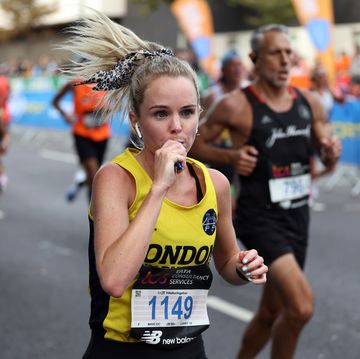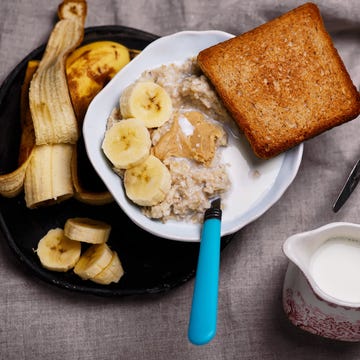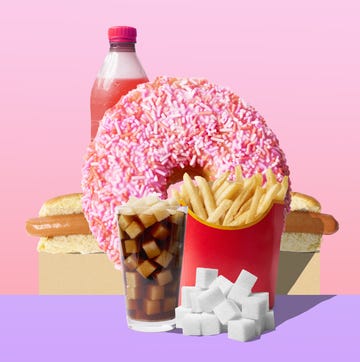An army marches on its stomach, and runners train on theirs. When you run, your fuel supply is either carbs or fat. During recovery, your fuel choices are even more key.
You might be aware of how crucial carbohydrates are during a run (enter the best energy gels, chews and drinks), but perhaps you’re less aware of the importance of carbohydrates for recovery and adaptation. Remember, if you don’t recover, you can’t adapt, so what you do after you train can impact the overall benefit of that session.
Why are carbohydrates important for recovery?
The carbohydrate contribution to recovery happens in two stages. The first (and perhaps most obvious) one is what happens after you’ve finished running. On a run, you’re powering your muscles with an energy-carrying molecule called ATP (adenosine triphosphate) that comes from the metabolism of fats or carbohydrates. The relative contribution of these different ‘fuel tanks’ largely depends on the intensity of the run – your 5K at best effort is powered primarily by carbs, whereas your slower recovery runs and longer training runs are mostly fat-fuelled.
What everyone's reading
After your harder and longer runs, your carb stores may be almost depleted. There’s ample evidence to suggest that if you don’t replace them, your ability to adapt to training will be affected, and you’ll overtrain sooner, on a lower ‘dose’ of running than you might have if you’d replaced the carbs.
Carbohydrates protect athletes against fatigue
In a study of cyclists, those who ate a diet higher in carbohydrates (8.5g per kg of body weight per day, or 680g for an 80kg cyclist) were ‘protected’ against the effects of fatigue during a programme that was designed to cause overtraining. Cyclists who ate a diet lower in carbs (5.4g per kg or 430g for an 80kg cyclist) saw steeper declines in performance. What’s more, the effect of fatigue during a time trial impacted the high-carb group less than the low-carb group.
The lesson – reinforced by other studies, which have also found that mood and emotional state are worse on low-carbohydrate diets – is that your training programme will be far more effective if you pay attention to nutrition, and to refilling your tank after it's been depleted.
Carbohydrates help reduce muscle damage
The next thing to note (and this is the part that you may not recognise) is that your carb intake while running also accelerates post-run recovery. Muscle damage is one metric that’s especially important for runners, so with chronic high-training volumes, it becomes quite a good barometer for training status. Overtrained runners often have achy muscles, even at rest, because they’re permanently in a state of mild damage. Research has found that muscle damage is reduced when carbohydrate intake is higher during exercise, which shows that carbs may have a protective effect.
Carbohydrates restore glycogen levels
Ensuring that you don’t become depleted of carbs can also protect you against overtraining, as it alleviates pressure on the sympathetic nervous system. As a result, your hormonal system – which is responsible for driving the energy supply to the muscles – gets some reprieve. It means that your harder or longer runs are less physiologically stressful when your carbohydrate intake is higher, so you’ll recover faster from them.
How many carbohydrates should I eat?
But eating carbs on a run is tricky. Cyclists have it easier; they can carry litres of fluid on their bikes, so 40g to 60g of carbs per hour on a three-hour ride is relatively straightforward. But with running, the practicalities may be more limiting than your physiology. And recently, there’s been a shift towards trying to ingest even more carbs during exertion. Fortunately, while Ironman triathletes, cyclists and others are now aiming for 90g to 100g of carbs per hour, it’s not necessary for you to worry about hitting those levels.
What about elite marathon runners, you may ask – aren’t they also heading that way? For example, the group involved in both two-hour marathon attempts (one unsuccessful, the other successful) experimented with this, and would likely credit higher carb oxidation for Kipchoge’s sub-two-hour marathon (but the shoes should probably take more of the credit).
But these are elite athletes, whose fuel use is absolutely enormous because they’re running at such high intensity for over two hours. That, it’s safe to say, is not what we mere mortals do in a marathon. Our intensity is low enough that fats provide a very large proportion of our energy, and we don’t need much more than 40g to 60g per hour of carbs. That’s not too hard to get in, provided we have access to fluids or gels.
That said, if you’re aiming for a new marathon PB, it would be worthwhile to practise fuelling with more carbs and try to get accustomed to 90g per hour, because supplying energy at that rate may be the crucial factor at the end of your race.
The bottom line is that you must prioritise replenishment. If you’re doing longer sessions – or harder sessions such as intervals, which burn carbs at a faster rate – then consuming carbs during a run will jump-start your recovery. It’s a simple habit to implement that will allow you not only to train harder, but also to recover faster and more effectively, which compounds the training benefit.
What’s the easiest way to fuel up during a run?
Sports drinks
Most ready-made sports drinks on the market contain between 7g and 9g of sugar per 100ml. So if a drink has a carb content of 8g/100ml, then the target of 60g per hour would require you to drink 750ml of it every hour.
But if you’re aiming for 90g per hour, to maximise fuel delivery to the muscles, you’d need
to drink almost 1.2 litres every hour. See the problem? You may need a more carb-concentrated drink, but they come with the risk of stomach issues. And that’s why the mixtures of carbs that provide both glucose and fructose are safer than fuel sources that are just one or the other.
But don’t fear, 60g per hour should be more than adequate for you. In fact, 40g for marathon intensity will probably suffice, and that means you only need 500ml of your sports drink every hour. Powdered drinks also provide similar carb levels.
Energy gels
Gels are variable; however, most contain between 18g and 25g of carbs, so you’re looking at two or three per hour. Because gels are very concentrated, you’ll need to dilute them with water to avoid stomach issues – between 200ml and 300ml of water per gel should do the trick.
These methods all end up with you consuming around 60g per hour, together with 600ml to 800ml of water. But if you’re going hard during a race, you may need even more. Remember that you need to practise increasing your levels before the big day, just as you work on every other element of your training.















